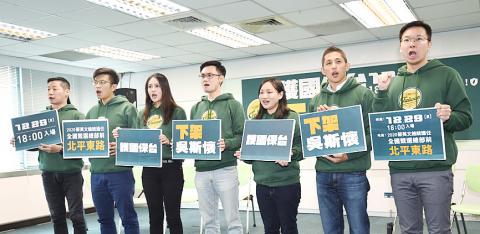The Democratic Progressive Party (DPP) yesterday unveiled a plan to counter “red infiltration” by staging a “safeguard Taiwan, boycott Wu Sz-huai” rally outside its Taipei headquarters on Sunday next week.
Retired army major general Wu Sz-huai (吳斯懷) is a Chinese Nationalist Party (KMT) legislator-at-large candidate. He sparked controversy following media reports that he attended an event in 2016 in China to commemorate the 150th birthday of Sun Yat-sen (孫逸仙), during which he sat through a speech by Chinese President Xi Jinping (習近平) and stood as participants sang the Chinese national anthem.
Wu and retired Central Police University associate professor Yeh Yu-lan (葉毓蘭) are clearly pro-China and pose a threat to the nation’s security if elected, DPP Vice Secretary-General Lin Fei-fan (林飛帆) said, adding that this issue concerns not only the DPP, but parties across the political spectrum.

Photo: Liu Hsin-de, Taipei Times
The KMT has repeatedly said that its goal is “to make Taiwan safe and its people rich,” but Lin asked how the nation can be safe if Wu makes his way into the Legislative Yuan.
It is regrettable that Wu has accused the DPP of attempting to sway public opinion against him, as it is his actions that prove he no longer recognizes the Republic of China (ROC), Lin said.
Wu on Thursday said that he would die defending the ROC, but it looks more like he wants to destroy the ROC, Lin said.

Photo: Tsai Ya-hua, Taipei Times
Enoch Wu (吳怡農), the DPP legislative candidate for the Zhongshan-Southern Songshan electoral district, said he initiated a drive to boycott Wu not to win points in the election, but to uphold national security.
Wu said he regrets that his rival, KMT Legislator Chiang Wan-an (蔣萬安), had chosen to remain silent over the issue, urging people to vote for a candidate who resolutely defends the nation in the Jan. 11 legislative elections.
Meanwhile, KMT Vice Chairman Hau Lung-bin (郝龍斌) accused the DPP of whipping up anti-China sentiment and instilling in people a sense of doom to gain an electoral advantage.
Young voters should wake up to the reality that contrary to the DPP’s statement that it would employ young people to help its administration, the unemployment rate among young people remains high, he told reporters while stumping for Chiang and KMT legislators Lee Yen-hsiu (李彥秀) and Alex Fai (費鴻泰) in Taipei.
The DPP rout in last year’s local elections showed that people loathed the party, which has damaged cross-strait relations, allowed the economy to stay weak and could not do anything right, he said.
Hau said he wants to ask voters if they are satisfied with the DPP administration’s performance over the past three years and if their answer is “no,” then they should vote the KMT back to power to improve the economy and cross-strait ties.
“With the DPP having obtained administrative power and a legislative majority, it would not have to take to the streets to impress the people if the economy was doing well and people’s pockets were full,” Lee said.
The DPP is at its wit’s end and can only resort to rousing up anti-China sentiment to grab the public’s attention, she said.
Since its massive losses in last year’s local elections, the DPP has relied on stirring up public hatred toward China and wasteful spending on subsidies in its election campaign, but the public has remained unhappy with President Tsai Ing-wen (蔡英文), Lee said.

ANOTHER EMERGES: The CWA yesterday said this year’s fourth storm of the typhoon season had formed in the South China Sea, but was not expected to affect Taiwan Tropical Storm Gaemi has intensified slightly as it heads toward Taiwan, where it is expected to affect the country in the coming days, the Central Weather Administration (CWA) said yesterday. As of 8am yesterday, the 120km-radius storm was 800km southeast of Oluanpi (鵝鑾鼻), Taiwan’s southernmost tip, moving at 9kph northwest, the agency said. A sea warning for Gaemi could be issued tonight at the earliest, it said, adding that the storm is projected to be closest to Taiwan on Wednesday or Thursday. Gaemi’s potential effect on Taiwan remains unclear, as that would depend on its direction, radius and intensity, forecasters said. Former Weather Forecast

As COVID-19 cases in Japan have been increasing for 10 consecutive weeks, people should get vaccinated before visiting the nation, the Centers for Disease Control (CDC) said. The centers reported 773 hospitalizations and 124 deaths related to COVID-19 in Taiwan last week. CDC Epidemic Intelligence Center Director Guo Hung-wei (郭宏偉) on Tuesday said the number of weekly COVID-19 cases reported in Japan has been increasing since mid-May and surpassed 55,000 cases from July 8 to July 14. The average number of COVID-19 patients at Japan’s healthcare facilities that week was also 1.39 times that of the week before and KP.3 is the dominant

The Chinese Communist Party’s (CCP) working group for Taiwan-related policies is likely to be upgraded to a committee-level body, a report commissioned by the Mainland Affairs Council (MAC) said. As Chinese President Xi Jinping (習近平) is increasingly likely to upgrade the CCP’s Central Leading Group for Taiwan Affairs, Taiwanese authorities should prepare by researching Xi and the CCP, the report said. At the third plenary session of the 20th Central Committee of the CCP, which ended on Thursday last week, the party set a target of 2029 for the completion of some tasks, meaning that Xi is likely preparing to

US-CHINA TRADE DISPUTE: Despite Beijing’s offer of preferential treatment, the lure of China has dimmed as Taiwanese and international investors move out Japan and the US have become the favored destinations for Taiwanese graduates as China’s attraction has waned over the years, the Ministry of Labor said. According to the ministry’s latest income and employment advisory published this month, 3,215 Taiwanese university graduates from the class of 2020 went to Japan, surpassing for the first time the 2,881 graduates who went to China. A total of 2,300 graduates from the class of 2021 went to the US, compared with the 2,262 who went to China, the document showed. The trend continued for the class of 2023, of whom 1,460 went to Japan, 1,334 went to